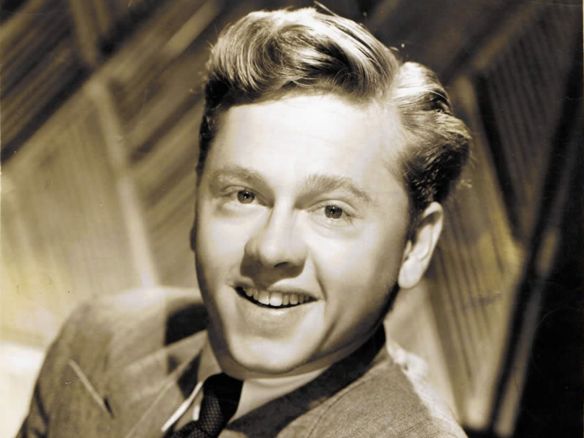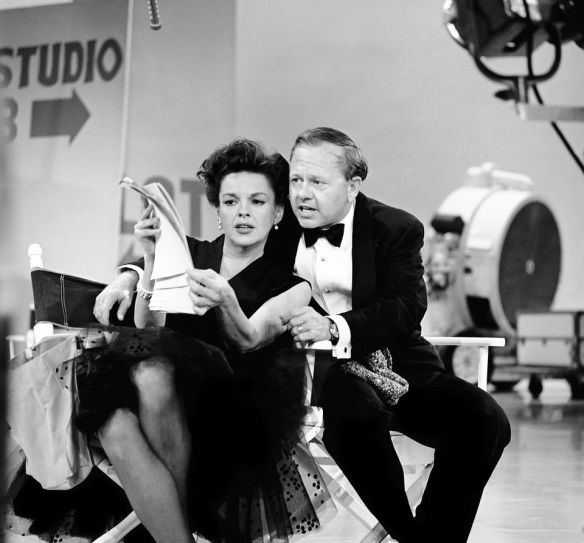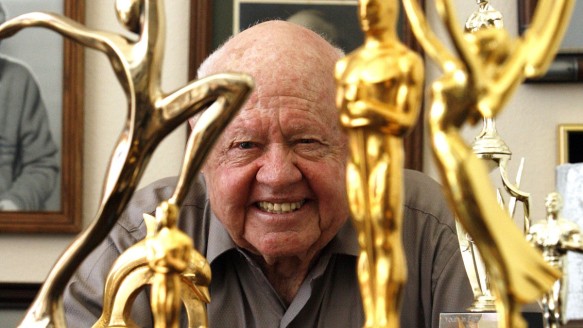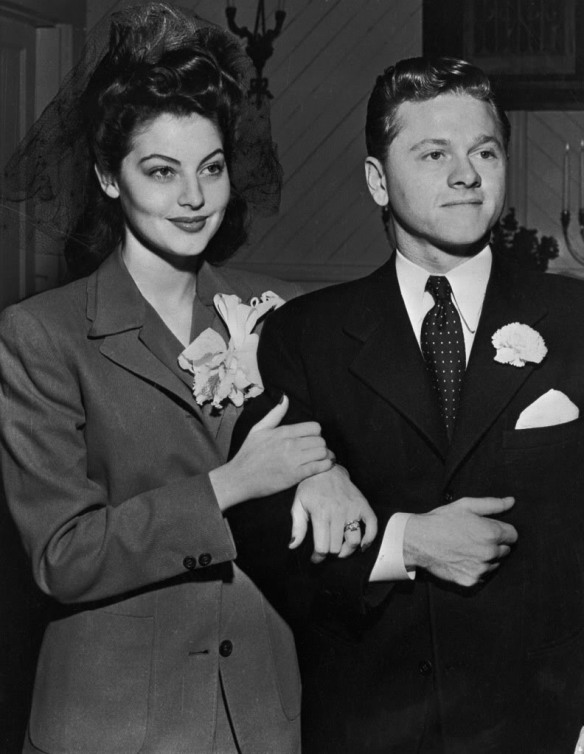L’acteur américain Mickey Rooney, qui a mené l’une des plus longues carrières de l’histoire hollywoodienne, est décédé dimanche à l’âge de 93 ans, ont rapporté les médias américains.
Né Joseph Yule, Mickey Rooney fut l’un des premiers enfants stars au cinéma, et connut une immense popularité dans les années 30 et 40. Selon le site TMZ, l’acteur, de santé fragile depuis plusieurs années, est décédé de mort naturelle. La bible hollywoodienne, Variety, a également confirmé le décès, sans toutefois en préciser les causes. Mickey Rooney, très apprécié et respecté à Hollywood, n’a quasiment jamais cessé de travailler. En 2011, il était encore à l’affiche des « Muppets ».
Né le 23 septembre 1920 dans le quartier de Brooklyn, à New York, il était le fils de deux acteurs de vaudeville itinérants. C’est auprès d’eux qu’il fait ses débuts en 1922, à 17 mois seulement. Il devient dès 1927 une star du cinéma muet en incarnant pendant huit ans un personnage comique devenu très populaire, Mickey Mc Guire, dont il prend le prénom. L’acteur enfant multiplie les tournages et devient l’idole de l’Amérique avec le film « Andy Hardy » (1937), où il joue le fils de famille turbulent à la mèche en bataille. Le film comptera 14 suites jusqu’en 1944 et préfigurera les séries télévisées. Ce rôle lui vaut un Oscar spécial pour « sa contribution significative à personnifier à l’écran l’esprit de la jeunesse ». Il triomphe ensuite en 1939 avec la comédie musicale « Place au rythme », où il forme un duo mythique de danseurs avec Judy Garland, qu’il retrouve dans « En avant la musique » (1940) et « Débuts à Broadway » (1941).
L’acteur, devenu également réalisateur, producteur, scénariste et compositeur, tourne énormément pendant quasiment neuf décennies. Il rencontre encore le succès en 1957 avec « L’Ennemi public » ou en 1979 avec « L’Etalon noir ». Mais après guerre son étoile commence à pâlir. Un Oscar d’honneur vient toutefois récompenser l’ensemble de sa carrière en 1983. En dehors des plateaux, l’acteur connaît une vie sentimentale agitée, se marie huit fois, divorce six fois, a neuf enfants. Sa première femme n’est autre qu’Ava Gardner, encore une starlette débutante en 1942 au moment du mariage… qui dure 16 petits mois. Il vivait avec sa huitième épouse, Jan Chamberlin, depuis 1978. AFP
Mickey Rooney dies at 93
The irrepressible performer Mickey Rooney, who died April 6 at 93, began appearing before audiences at 15 months in his parents’ vaudeville act, singing “Pal o’ My Cradle Days” while sporting a tuxedo and holding a rubber cigar.
So launched a nine-decade career of unapologetic scene-stealing — he could sing, dance, play drums and do pathos, pratfalls and impersonations — that once made him the top box-office draw in the world.
A fixture before the cameras since the silent-movie days, he was a perpetual dynamo who endured an astonishing series of reversals and revivals — honorary Oscars, has-been-dom, bankruptcy, Broadway success. Mr. Rooney appeared in more than 300 films and TV programs, in addition to his work in radio, recording, nightclubs and commercials.
His fame reached its pinnacle in the late 1930s and early 1940s, propelled largely by his role as Andy Hardy in the popular “Hardy Family” film series about the growing pains of an all-American teenager. The Hardy films earned more than $75 million for Metro-Goldwyn-Mayer studios at a time when movie tickets cost about 25 cents.
Mr. Rooney was often paired with Judy Garland — considered his equal in charisma and ability — in vibrant “let’s put on a show” musicals such as “Babes in Arms” (1939) and “Girl Crazy” (1943), many featuring indelible songs by the Gershwin brothers or the team of Richard Rodgers and Lorenz Hart. In addition, he was powerfully effective in dramas including “Boys Town” (1938), portraying a juvenile delinquent opposite Spencer Tracy’s tough-loving Father Flanagan, and “The Human Comedy” (1943), as a small-town telegraph messenger who delivers news of war casualties to parents back home.
One of his most captivating performances was as Puck in the 1935 all-star version of Shakespeare’s “A Midsummer Night’s Dream.” Film historian David Thomson said Mr. Rooney’s mischievous, almost bratty interpretation was “one of cinema’s most arresting pieces of magic.” Mr. Rooney emphasized how easy the part was for him, writing later in a memoir, “I’d never read Shakespeare before or since.”
In approaching roles, he rarely studied more than the outline of a script, even one based on Shakespeare, saying the spontaneity would dry up otherwise. In 1939, Mr. Rooney shared with actress Deanna Durbin a special Academy Award for “bringing to the screen the spirit and personification of youth, and . . . setting a high standard of ability and achievement.” In keeping with the intent of the prize, the statuettes were miniature Oscars.
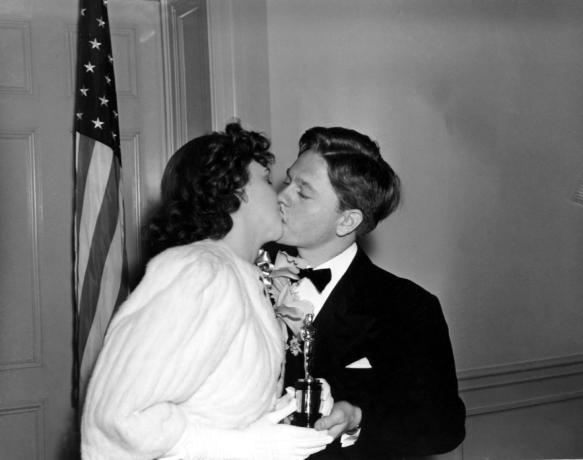
Judy Garland receives a kiss from Mickey Rooney as she is given a special award Oscar-Photo: all rights reserved-
As he passed through adolescence, Mr. Rooney topped off just over 5 feet tall, and his physical stature and increasing girth seemed to limit his film roles as he aged. After World War II — he was a decorated Army veteran — his stardom collapsed. He was reckless in his personal behavior, appearing drunk and combative in television appearances. He tore through marriages and, for a while, he was reduced to accepting movie roles opposite talking mules and ducks.Yet Mr. Rooney proved capable of compelling portraits of cruelty and poignancy.
On television, Mr. Rooney received an Emmy Award nomination for playing a rotten-to-the-core entertainer in Rod Serling’s “The Comedian” (1957). He also won an Emmy for outstanding lead actor in a limited series or a special for “Bill” (1981), about a man with mental disabilities struggling with life outside an institution.
Starting in 1979, Mr. Rooney starred with former movie dancer Ann Miller in the long-running vaudeville and burlesque tribute “Sugar Babies.” The show brought Tony Award nominations to Mr. Rooney and Miller.
“Mr. Rooney had talent to burn, and he burned it,” film historian Jeanine D. Basinger wrote in “The Star Machine,” a 2007 book about the studio system that made Mr. Rooney famous. “He has done everything there is to do in show business, all with equal success, and it might be said, equal failure.”
Mr. Rooney was born Joe Yule Jr. on Sept. 23, 1920, at a boardinghouse in Brooklyn. After his parents divorced, Mr. Rooney was taken to Hollywood by his mother, and his precociousness won him unusual adult roles.
In one of his earliest films, “Orchids and Ermine” (1927), he plays a little person who propositions screen beauty Colleen Moore between puffs on a cigar. The constant rubbing of the cigar caused one of his baby teeth to fall out.
That same year, he legally changed his name to Mickey McGuire when he was cast in a series of comedy shorts of the same name, based on a popular comic strip.
He starred in nearly 50 of the Mickey McGuire shorts spanning the silent and early sound eras. A financial dispute between the film’s producer and the cartoonist led the young actor again to change his name, to Mickey Rooney. MGM signed him to a long-term contract in 1934 and worked hard to cultivate Mr. Rooney as the personification of brash American youth.
Besides Andy Hardy, Mr. Rooney continued in that vein in films such as “The Adventures of Huckleberry Finn” (1939), “Young Tom Edison” (1940) and “A Yank at Eton” (1942). He also managed a more subdued performance as a raffish horse trainer in “National Velvet” (1944), which made a star of 12-year-old Elizabeth Taylor.
Starting in the 1950s, Mr. Rooney turned to character roles that showcased his range: a helicopter pilot in “The Bridges at Toko-Ri” (1954); Anthony Quinn’s boxing trainer in “Requiem for a Heavyweight” (1962); and a has-been horse trainer in “The Black Stallion” (1979).
The 1961 film “Breakfast at Tiffany’s” allowed Mr. Rooney to ham it up as the bucktoothed Asian neighbor of Audrey Hepburn. Mr. Rooney’s performance, called “broadly exotic” by a New York Times critic at the time, is regarded as an embarrassing caricature today.
After the popular success of “Sugar Babies,” Mr. Rooney received his second honorary Oscar, for “50 years of versatility in a variety of memorable film performances.” His film appearances dwindled to small roles — he was a security guard in the Ben Stiller comedy “Night at the Museum” (2006) — but he continued working through this year.
Besides Gardner, his marriages to beauty queen Betty Jane Rase, actress Martha Vickers, Elaine Mahnken, Margie Lane and Carolyn Hockett ended in divorce. His estranged fifth wife, Barbara Thomason, was killed in a murder-suicide with her lover in 1966. Survivors include his eighth wife, singer Jan Chamberlin, and numerous children. The Los Angeles County Coroner’s Office confirmed Mr. Rooney’s death.
Mr. Rooney’s early roots in vaudeville, his gag-a-second training ground, defined much of his persona. He was fond of lewd jokes and made relentless puns about his height.“I’ve been short all my life,” he wrote in his memoir “Life is Too Short.” “And if anyone wonders what my dying wish will be, they can stop wondering. That will be easy. I’ll just tell them, ‘I’ll have a short bier.’ In http://www.washingtonpost.com

